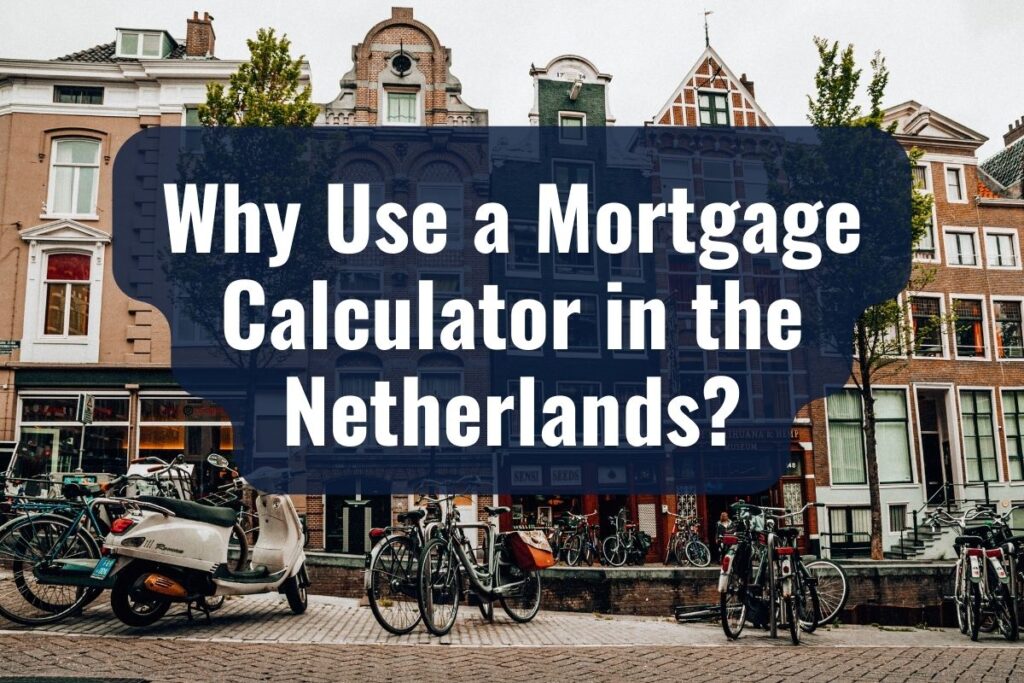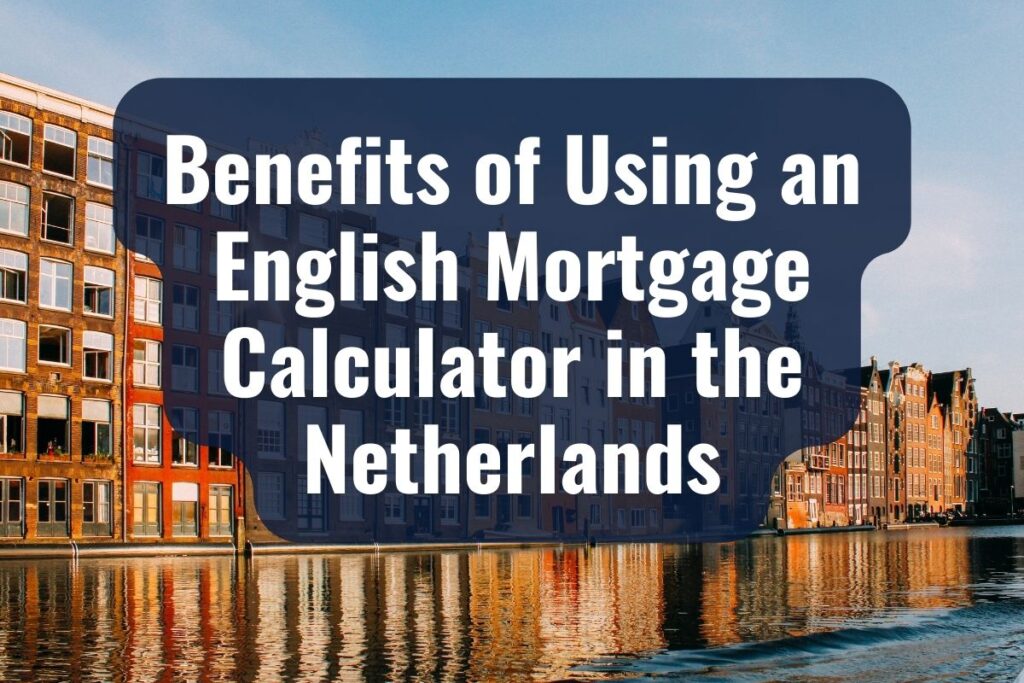[mortgagecalculator]
Use our free mortgage calculator to get an idea about your home loan.
- Home Price (EUR): Specify the total purchase price of the home.
- Down Payment (EUR): Indicate the amount you will pay upfront towards the home purchase.
- Interest Rate (%): Enter the annual interest rate of the mortgage loan.
- Loan Term (years): Specify the duration over which you will repay the loan, in years.
- Property Tax (EUR/year): (Optional) Include the annual property tax amount, if applicable.
- Home Insurance (EUR/year): (Optional) Add the yearly cost of home insurance, if desired.
*Calculation example: Total credit amount €33,600. Term 11 years. APR 7.45%. Variable debtor interest 7.00%. Establishment €336. Total repayment €48,692. Term 1-15 years. Interest rate range 0.00-24.24%.
In this article, we will cover everything you need to know about using a mortgage calculator in The Netherlands — from its utility to its features and how to use one effectively.
Key Takeaways:
- A mortgage calculator is essential for understanding your financial commitment when buying property in The Netherlands.
- Ensure the calculator you use has features specific to the Dutch market, like additional costs.
- Be cautious not to rely solely on the calculator’s output; it’s a guide, not a definitive answer.
- Additional factors like tax benefits and future interest rate changes should also be considered.
- Utilize multiple resources, like English-friendly banks and financial advisors, for a well-rounded perspective.
The Basics of Dutch Mortgages
In order to make informed decisions, especially in a foreign land, it’s imperative to understand the basic foundation of the subject at hand. When it comes to mortgages in the Netherlands, there are certain key aspects that make them distinct.
What is a Mortgage?
At its core, a mortgage is essentially a loan specifically meant for purchasing property. In the context of the Netherlands, when you take out a mortgage, you’re borrowing money to buy a home and then paying back the loan, plus interest, over a set period of time.
Typical Structure of Dutch Mortgages
The Netherlands offers a range of mortgage types, but two primary structures stand out:
Fixed Interest Rate Mortgages
With this setup, your interest rate remains unchanged for a specified period – be it 5, 10, 20, or even 30 years. This is a popular choice among many, primarily because it provides the reassurance of stable monthly payments, allowing for consistent budgeting.
Variable Interest Rate Mortgages
As the name suggests, the interest rate on this mortgage type can fluctuate based on market conditions. While this might mean potentially lower interest rates during certain periods, it also carries the uncertainty of potential rate increases.
Terms and Durations
The length of a Dutch mortgage can vary, with the most common terms being 20 to 30 years. However, the actual duration that’s best for you will depend on various factors, including your financial stability, age, and long-term plans. Remember, while a longer-term might mean smaller monthly payments, it could also entail paying more in interest over the lifespan of the loan.
National Mortgage Guarantee (NHG)
A notable feature in the Dutch mortgage system is the NHG or Nationale Hypotheek Garantie. This guarantee offers protection to both the lender and borrower in case of unforeseen financial difficulties. It ensures that if you’re unable to repay the mortgage due to circumstances like unemployment or disability, the NHG will cover the outstanding amount, adding an extra layer of security.
Why Use a Mortgage Calculator in the Netherlands?

The path to securing a property in the Netherlands, like anywhere else, is filled with numbers. Monthly payments, interest rates, and total loan amounts can become a whirlwind of figures that might leave you feeling overwhelmed. Here’s where the true utility of a mortgage calculator shines through.
Saving Time and Stress
Gone are the days when you’d need to manually calculate your monthly payments or total interest over the loan’s lifespan. A mortgage calculator offers immediate insights tailored specifically for the Dutch housing market. Input the necessary details, and within moments, you have a clear picture of your potential financial commitment.
For those who don’t speak Dutch, a mortgage calculator in English can be a godsend. It provides a clear and accessible way to understand the intricacies of the Dutch mortgage system without the added strain of language barriers.
Predicting Your Financial Future
A mortgage is a long-term commitment. By using a calculator, you can:
Understand Monthly Payments: This tool allows you to ascertain how much you’ll need to set aside every month. By knowing this, you can budget effectively, ensuring you live comfortably while meeting your financial obligations.
Assess Total Interest: With interest being a significant portion of any loan, it’s crucial to know how much you’ll be paying over time. A mortgage calculator helps demystify this, letting you see the bigger financial picture.
Mitigating Risks
Property investment, especially in a foreign country, carries inherent risks. However, knowledge is power:
Informed Decisions: When you have a clear understanding of what your mortgage might look like, you can compare different offers, ensuring you choose the best option available.
Financial Preparedness: By understanding the potential financial implications of your mortgage, you can mitigate surprises down the road, making for a smoother property ownership journey.
Key Components of a Dutch Mortgage Calculator
When you first encounter a mortgage calculator, especially one tailored for the Dutch market, you might notice specific components that you’re prompted to input or consider. These elements play a pivotal role in accurately gauging your mortgage expectations. Let’s demystify these components, ensuring you utilize the calculator effectively.
Loan Amount
This is the foundational element. Simply put, the loan amount is the total sum of money you plan to borrow. While it might be tempting to think of the highest possible number, it’s essential to consider what’s financially sustainable for you. Always remember, this is the principal amount, and interest will be added to it.
Interest Rate
There are two primary types to keep in mind:
- Fixed Rate: If you opt for a fixed interest rate mortgage, this rate will stay consistent for the duration of your chosen term. It provides predictability but may not always be the lowest rate available.
- Variable Rate: With a variable interest rate, the percentage might change based on market conditions. While this can lead to potential savings during periods of low rates, it also comes with the uncertainty of potential rate hikes.
Mortgage Term
This refers to the total number of years you’ll be repaying the loan. In the Netherlands, common terms range from 20 to 30 years. Remember, while selecting a longer term can reduce your monthly payments, it might also result in paying more in interest over time.
Property Taxes, Insurances, and Other Fees
Owning property isn’t just about repaying the loan. There are additional costs to consider:
- Property Taxes: These are annual taxes, and the rate can vary depending on the municipality and the value of the property.
- Home Insurance: Essential for protecting your property against unforeseen damages or calamities.
- Notary Fees and Transfer Taxes: These are one-time fees when buying a home. Notary fees cover the legal process, while transfer taxes are a percentage of the property price.
National Mortgage Guarantee (NHG)
If you opt for an NHG-backed mortgage, it can affect the terms and interest rate of your mortgage. This guarantee adds an extra layer of security but also comes with its set of prerequisites and conditions.
Related: Buying a House in the Netherlands: A 2026 Guidebook
Benefits of Using an English Mortgage Calculator in the Netherlands

Navigating the Dutch property market can sometimes feel like deciphering a puzzle – a puzzle made even more intricate when language barriers come into play. Thankfully, with tools like an English mortgage calculator tailored for the Netherlands, many of these challenges can be effortlessly addressed.
Overcoming Language Barriers
Perhaps the most evident benefit, but worth emphasizing.
No more getting lost in complex Dutch financial jargon. An English calculator offers straightforward insights, ensuring you grasp every detail without the fear of misinterpretation.
Time is of the essence, especially in bustling property markets. Having a tool in a language you’re comfortable with speeds up the decision-making process.
Comprehensive Comparisons
Different mortgage offers can have subtle variations that might make a significant impact over time:
Comparing Offers with Ease: Input the details of various mortgage offers into the calculator and get a clear picture of which one suits your needs the best.
Empowered Negotiations: Understanding the numbers puts you in a stronger position when negotiating with banks or brokers. You know what you’re talking about, and it shows.
Boosted Confidence
Knowledge brings a certain assuredness, and when you’re venturing into significant financial decisions, confidence is priceless:
Transparent Decision-making: When you see the figures laid out clearly, you’re less likely to second-guess your decisions.
Peace of Mind: Being certain of your financial commitments, potential risks, and benefits leads to a more peaceful property-buying experience.
Tailored Insights
Every country has its unique property market nuances, and the Netherlands is no exception:
Specific to the Dutch Market: A mortgage calculator designed for the Dutch market takes into account the specificities of local interest rates, taxes, and regulations, offering you insights that generic calculators can’t.
Stay Updated: As the Dutch property market evolves, so do the tools tailored for it. Using a dedicated calculator ensures you’re always working with the most current and relevant information.
Tips for Expats and International Investors
Stepping onto the Dutch property platform can be both thrilling and daunting. As expats and international investors, certain additional considerations can come into play. We’ve compiled some essential tips to help guide you smoothly through the intricacies of this new journey.
Localize Your Research
While global perspectives are valuable, diving deep into local insights can make all the difference:
- Local Expertise: Consider partnering with a local real estate agent or financial advisor who understands the Dutch property market’s ins and outs.
- Stay Updated: The housing market and its associated regulations can change. Regularly check local news sources or industry-specific publications for any significant shifts.
Understand Cultural Nuances
Every country has its property-buying traditions and unwritten rules:
- Open Houses: The Netherlands often has ‘Open House’ days where multiple properties are available for viewing without appointments.
- Negotiation Styles: Dutch sellers appreciate straightforwardness. While negotiations are expected, it’s essential to approach them with respect and clarity.
Consider Future Resale Potential
If you’re an international investor or unsure about long-term plans:
- Location Matters: Opt for properties in well-connected areas with good infrastructure, as they tend to retain (or even increase) their value over time.
- Stay Neutral: When renovating or decorating, consider styles that appeal to a broad audience, ensuring easier resales.
Look into Financing Options
Understanding how the Dutch banking system caters to foreigners can be advantageous:
- Expatriate Packages: Some banks offer specialized mortgage deals for expatriates, with terms that might be more favorable or aligned with international needs.
- Alternative Financing: Besides traditional banks, explore other lending options, such as international banks or private lenders who might be more flexible or offer unique benefits.
Don’t Skip the Fine Print
Especially for those not fluent in Dutch, it’s crucial:
- Legal Assistance: Engage with a notary or legal expert to review any contracts or agreements. It ensures you’re aware of all obligations and fine details.
- Translation Services: While many documents might be available in English, it’s wise to get an official translation of crucial papers to avoid any misunderstandings.
Related: Housing in the Netherlands: An Expat’s Complete Guide (2026)